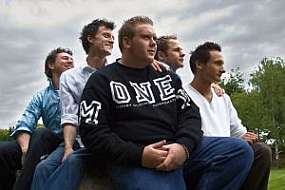It’s hard to get away from the emphasis in some Christian circles on small groups. Just today, I was reading Brad Hightower’s excellent blog 21st Century Reformation and his post “Are the Popular Methods of Doing Church Working?” It’s a good question and good people are trying to answer it. Many of them are saying small groups are the answer, as does Brad. The bleeding edge of ecclesiology today runs red with the hope that house churches will be the salvation of the American Church.
I dunno.
We tend to forget that small groups in the church are not new. I’ve been in small groups since the 1970s. The modern roots of the small group movement predate even that time.  Psychologists of the 1950s had discussed the need for small encounter groups, but that idea didn’t express itself until the 1960s and the experimental groups of Big Sur. (The less said about them the better.)
Psychologists of the 1950s had discussed the need for small encounter groups, but that idea didn’t express itself until the 1960s and the experimental groups of Big Sur. (The less said about them the better.)
In another attempt by Christians to co-opt what was going on in psychology circles, we started seeing a redemption of pop-psych methods by certain churches, parachurch organizations, and nationally-known Christian leaders. Who could impeach the argument that Jesus gathered twelve men around Himself? (True, yes, but that idea hadn’t been re-examined until pushed into the limelight by 1950s behavioral science.)
Since the 1960s, folks have been trumpeting the salvation of the Western Church through small groups. All I ask is this:
We’ve had 40+ years of small groups in churches, but are we any better for it?
I certainly would not say that the Christian Church in America is more devout, more mission-minded, more prayerful, or more effective for Christ now than before the small group push started. If that’s true—and I’m sure most of you reading this will agree we’re not better off—how then can we insist that small groups will somehow turn the tide in the future if they’ve failed to do so thus far?
Part of the reason I believe that small groups have resoundingly failed to deliver on their promise is that no one seems to look at them from the right perspective. We never view small groups as aiding the church as a collective body. Our model is more based on the idea that we’re helping individuals plug-in on a more granular level.
But that’s the typical Evangelical obsession with the individual. Meet the individual’s need on a very intimate level and you’ll build a wildly effective church from that core. Forty years later, that failed mentality still prevails.
We’ve got to stop viewing the world through the lens of the individual and start thinking more about the corporate Body of Christ. If small groups are not translating into a better church filled with better people, then perhaps we need to start thinking about making our entire church a small group, the whole assembled mass of people. Rather than fragmenting our assembled community into small groups, perhaps we can find ways to translate what small groups do well to an entire church.
For instance, we belong to two small groups that start their meetings with a shared meal. What if we decided that our churches would meet every week for a shared sit-down meal and serve communion at the same time? What if we made our Sunday messages open for whole church comment just like the discussions we have in small groups? What if…?
Obviously, megachurches will have some troubles with these things. But then maybe a 500-person church that acts like a small group is the better model than a 5,000 person church cookie-cuttered into 500 small groups.
All I know is that the small group model that was supposed to better our churches hasn’t. If the model’s broken, then we either fix it or dump it. Or we find a third way that considers the whole church a small group. Whatever the answer, pouring more energy into our current practice of small groups isn’t going to get us anywhere.

 Hegel basically created his philosophy to explain the process of history. First there is one view or event called the thesis. Then there is the opposing view or event called antithesis. Out of these two (many times a compromise of the two; other times simply the end process of the two clashing) is the synthesis.
Hegel basically created his philosophy to explain the process of history. First there is one view or event called the thesis. Then there is the opposing view or event called antithesis. Out of these two (many times a compromise of the two; other times simply the end process of the two clashing) is the synthesis.